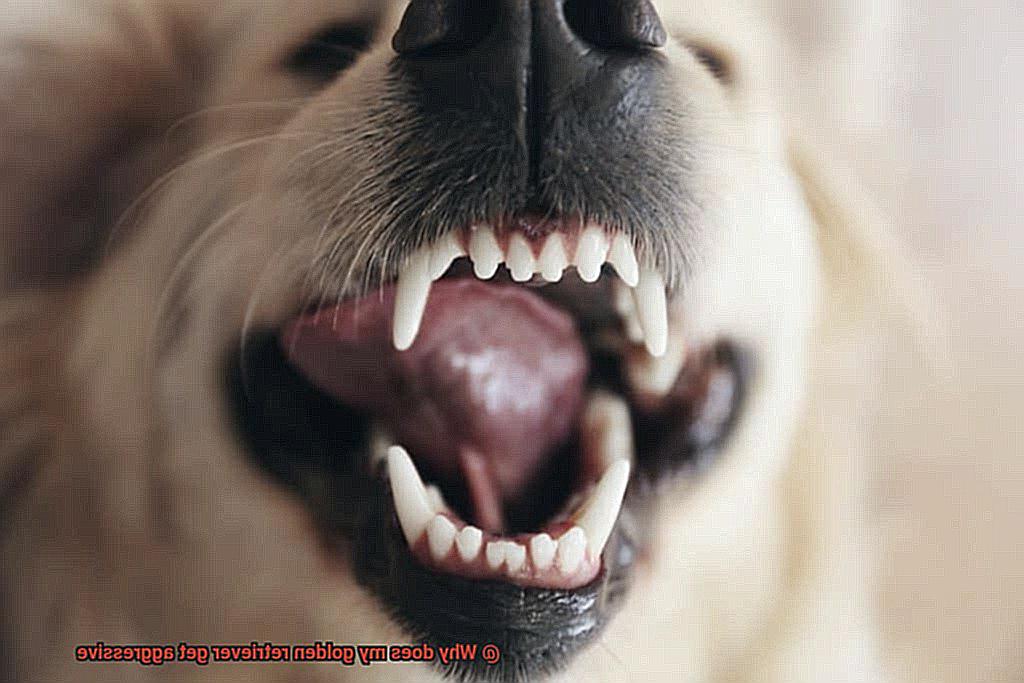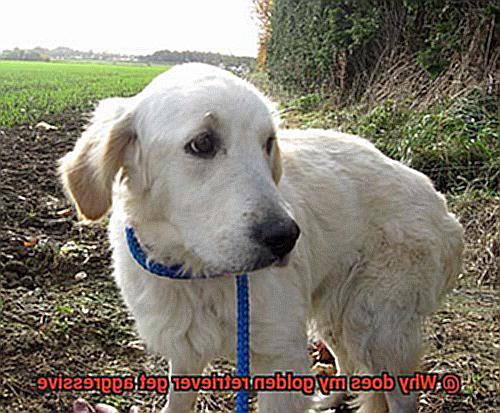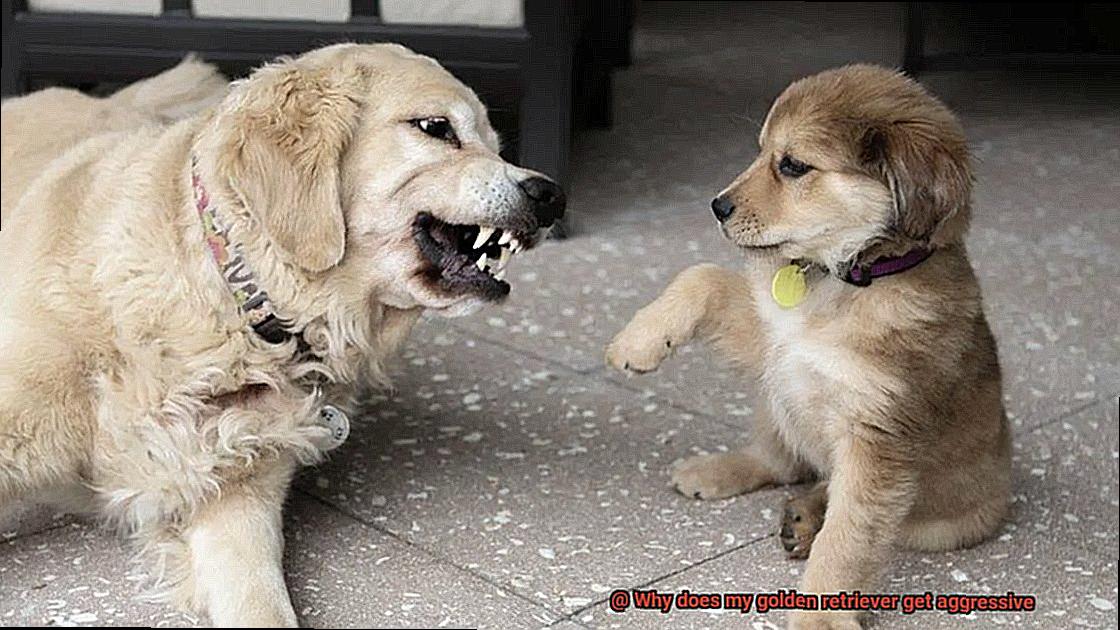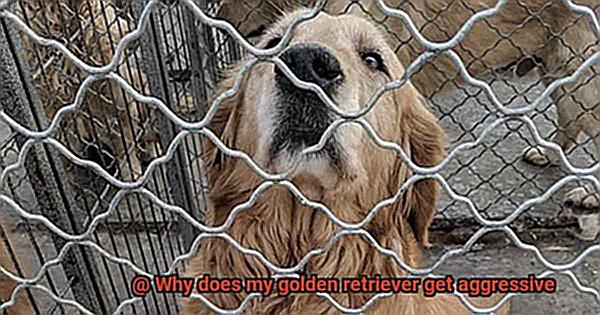Golden Retrievers are known for their affectionate and devoted nature. They’re a beloved breed around the world, cherished by families for their playful and friendly personalities. However, as much as we adore our furry companions, sometimes we may notice a shift in their behavior. Suddenly, our once-bubbly pup becomes irritable, snappy, and even aggressive. It’s a confusing and alarming situation that no pet parent wants to face, but it’s not uncommon.
Aggression in Golden Retrievers can stem from various factors such as fear, frustration, territorial aggression or underlying health issues. Each dog is unique, and just like humans, they can experience emotions due to environmental factors that affect how they behave.
Understanding the root cause of your golden retriever’s aggression is crucial in correcting their behavior. In this blog post, we’ll dive deeper into the possible triggers that cause aggression in Golden Retrievers. We’ll also explore ways to identify early signs of aggression and provide tips on how to train and socialize your golden retriever to prevent aggressive behavior. Additionally, we’ll discuss how you can address any underlying health issues that may be contributing to your golden retriever’s aggression.
So, keep reading.
Why Do Golden Retrievers Become Aggressive?
Contents
- 1 Why Do Golden Retrievers Become Aggressive?
- 2 Identifying the Underlying Cause of Aggression in Your Dog
- 3 Working with a Professional Trainer or Behaviorist
- 4 Patience, Training, and Positive Reinforcement
- 5 Common Signs of Aggression in Golden Retrievers
- 6 How to Prevent Aggression in Your Golden Retriever
- 7 Conclusion
Golden Retrievers are renowned for their friendly and gentle nature, making them a beloved choice for families looking for a furry companion. However, even the kindest of dogs can display aggressive behavior under certain circumstances.
It is vital to explore why Golden Retrievers may exhibit aggression.
Fear and Anxiety
Golden retrievers are known for their friendly and affectionate nature, but they can also display aggressive behavior. Fear and anxiety are often the root causes of such behavior. These emotions can manifest in numerous ways, including growling, snarling, biting or snapping. Certain situations like loud noises, unfamiliar people or pets, or being separated from their owners can trigger these behaviors.
It’s crucial to understand that fear and anxiety can be caused by several factors, such as genetics, past experiences, and lack of socialization. For instance, if a golden retriever has had a traumatic experience with another dog, they may become fearful and anxious around all dogs.
To prevent fear and anxiety-related aggression in golden retrievers, it’s essential to socialize them from a young age. This involves exposing them to different people, animals, and environments in a positive and controlled manner. Additionally, providing them with plenty of exercise and mental stimulation can help reduce stress levels.
If your golden retriever displays aggressive behavior due to fear and anxiety, it’s important to seek professional help from a veterinarian or animal behaviorist. They can provide guidance on how to manage your dog’s behavior through training techniques or medication if necessary.
Aggression is never the answer when it comes to dealing with a fearful or anxious golden retriever. Punishing them for their behavior will only make things worse, as it will increase their stress levels and make them more fearful.
Instead, approach your furry friend with patience and positive reinforcement. By rewarding good behavior and gently correcting negative behavior, you can help your golden retriever overcome their fears and anxieties.
Territorial Behavior
This is a natural instinct in dogs and Golden Retrievers are no exception. While they are known for their friendly and amiable nature, they can become aggressive when they feel their territory is being invaded or threatened.
Golden Retrievers have a strong sense of ownership over their property and space. This means that they may become territorial if they perceive any encroachment on their territory. This can happen in various situations, such as when a stranger enters the home or when another dog comes too close to their owner or their favorite toy.

It’s essential to establish clear boundaries and rules early on to prevent territorial aggression. Training your dog to understand what is acceptable and what is not can go a long way in preventing aggressive behavior. Socialization is also crucial in preventing territorial aggression. Exposing your Golden Retriever to different people, animals, and environments from an early age can help them learn how to interact appropriately.
However, if you notice signs of territorial aggression in your Golden Retriever, it’s crucial to seek professional help from a veterinarian or dog behaviorist. They can help identify the underlying cause of the behavior and provide strategies for managing it effectively.
Territorial aggression is not necessarily a sign of a bad temperament or personality; it’s just a natural response to perceived threats. With proper training and management, territorial aggression in Golden Retrievers can be reduced or even eliminated entirely.
Medical Issues
Aggression is not always merely a behavioral issue but can be a symptom of an underlying medical problem. The following are medical issues that can cause aggression in golden retrievers and how you can manage them.
Pain is one of the most common causes of aggression in dogs, and your golden retriever is no exception. They may snap or growl when touched or approached in a certain way as they try to protect themselves from their pain. Arthritis, dental problems, or injuries can all cause pain. If you notice any signs of aggression or discomfort, take your dog to the veterinarian to rule out underlying medical conditions that could be causing them pain.
Hormonal imbalances can also lead to aggressive behavior in golden retrievers. Thyroid problems and adrenal gland disorders are common hormonal imbalances that can affect dogs and cause changes in their behavior, including aggression. Your veterinarian can perform blood tests to determine if your dog has a hormonal imbalance.
Neurological disorders such as epilepsy or brain tumors can also cause aggression in golden retrievers. These disorders affect the brain and nervous system and can cause changes in behavior. If you notice your dog exhibiting unusual behaviors or becoming aggressive without any clear reason, it is essential to take them to the veterinarian for a thorough examination.

Lack of Socialization and Training
Socialization is a critical process that involves exposing your dog to different people, animals, and environments. This process helps your furry friend develop trust and confidence in the world around them. Without proper socialization, dogs may feel fearful or anxious in new situations, which can lead to defensive or aggressive behaviors.
Training is also essential for preventing aggression in golden retrievers. Dogs that are not trained may become unruly and disobedient, leading to frustration and potentially aggressive behaviors. Basic obedience training, such as sit, stay, and come commands, can help establish clear boundaries and expectations for your dog.

Furthermore, it’s worth noting that some golden retrievers may have a genetic predisposition towards aggression. If you notice any signs of aggression in your dog, it’s crucial to seek professional help from a veterinarian or animal behaviorist. They can assess your dog’s behavior and provide guidance on how to address any aggression issues.
Identifying the Underlying Cause of Aggression in Your Dog

However, when our golden retrievers start displaying aggressive behavior, it can be both worrying and alarming. That’s why it’s crucial to identify the underlying cause of aggression in your dog.
Aggression in dogs can stem from a variety of factors, including genetics, environment, medical conditions, and socialization. Genetics play a significant role in a dog’s temperament and personality. Although golden retrievers are known for their friendly and docile nature, some may have a genetic predisposition towards aggression. It’s important to keep this possibility in mind and monitor your dog’s behavior closely.
Environmental factors such as insufficient exercise or socialization can also contribute to aggressive behavior in golden retrievers. Dogs who do not receive enough exercise or lack socialization with other dogs or humans may become fearful or anxious, which can lead to aggressive behavior.
Medical conditions such as pain or discomfort can also cause sudden or uncharacteristic aggression in golden retrievers. If you notice any changes in your dog’s behavior, it’s worth getting them checked out by a veterinarian to rule out any underlying medical issues.
Lastly, proper socialization is crucial in preventing aggressive behavior in golden retrievers. Introducing your dog to different people, animals, and environments at an early age can help them become well-adjusted and comfortable around others.
Working with a Professional Trainer or Behaviorist
If you’re struggling with aggression in your golden retriever, don’t despair. Working with a professional trainer or behaviorist can be a fantastic option to help your furry friend overcome their aggressive tendencies.
But how do you choose the right professional for your dog? It’s essential to select someone with experience working with aggression in dogs, particularly golden retrievers. A positive reinforcement approach is critical, as punishment-based methods can often make aggression issues worse.
During your consultation, the trainer or behaviorist will gather information about your dog’s history and conduct a behavioral assessment to determine triggers and responses. Armed with this information, they will develop a customized plan that may include desensitization and counter-conditioning exercises, obedience training, and management strategies.
It’s essential to follow their guidance closely and remain consistent with the training, as progress may take time. Additionally, practicing responsible ownership by providing your dog with adequate exercise and mental stimulation, a safe living environment, and avoiding situations that may trigger their aggression is crucial.

Patience, Training, and Positive Reinforcement
When it comes to managing aggression in golden retrievers, patience is crucial. Correcting aggressive behavior takes time and effort, but consistency in training is key. It’s best to start training your furry friend at a young age and continue throughout their life. This will help prevent confusion and reverting back to old habits.
Positive reinforcement is a highly effective method of training that rewards your dog’s good behavior with praise, treats, or toys. This encourages your furry friend to repeat desirable behavior, making it more likely that they will continue to do so in the future. In contrast, negative reinforcement or punishment can be ineffective and even exacerbate aggressive behavior.
Remember that every dog has their unique personality and needs. Hence, it’s crucial to tailor your training methods to suit your individual dog. Some dogs may respond well to clicker training, while others may prefer verbal praise or treats.
Lastly, be patient and consistent throughout the training process. Aggression cannot be corrected overnight. Consistent training over several weeks or months is needed before any improvement can be seen in your dog’s behavior. But with time and effort, most golden retrievers can learn to manage their aggression and become well-behaved family pets.
Common Signs of Aggression in Golden Retrievers
Golden Retrievers are beloved for their gentle and affectionate nature, but like any other breed, they can exhibit aggression. As a responsible pet owner, it is vital to recognize the signs of aggression in your Golden Retriever to prevent any potential harm to yourself or others.
Growling or snarling is a common sign of aggression in Golden Retrievers. This behavior often occurs when they feel threatened or uncomfortable in a particular situation or around certain people. If you notice these warning signs, it is essential to respect their boundaries and avoid provoking them.
Biting or nipping is another alarming sign of aggression. This type of behavior can be dangerous, particularly if it happens without any warning signs. It may be necessary to seek professional help from a dog trainer or behaviorist if your Golden Retriever displays this kind of aggressive behavior.
Resource guarding is another form of aggression in Golden Retrievers that occurs when they become territorial over their toys, food, or sleeping area. They may growl or snap at anyone who tries to approach them while in this state. It is crucial to teach your Golden Retriever the importance of sharing and help them overcome this aggressive behavior.
Fear-based aggression is also prevalent among Golden Retrievers. This type of aggression occurs when they feel scared or threatened, leading them to lash out at anyone or anything that comes near them. Identifying the triggers that cause your dog’s fear and working with a professional trainer can help manage this type of aggression.
How to Prevent Aggression in Your Golden Retriever
Preventing aggression in your golden retriever is crucial for their well-being and the safety of those around them. As a responsible pet owner, it’s essential to take proactive steps to prevent aggressive behavior in your furry friend. Here are five sub-sections that will explain how to prevent aggression in your golden retriever.
Socialization: The First Step
Socializing your golden retriever is the first step in preventing aggression. Exposing them to different people, pets, and environments can help them become comfortable and confident in various situations. Early socialization can also help your golden retriever learn how to interact with others and be comfortable in new environments.
Training: Establishing Yourself as the Leader
Training is an essential part of preventing aggression in your golden retriever. Positive reinforcement techniques such as rewarding good behavior can help strengthen the bond between you and your dog while also teaching them appropriate behaviors. Basic commands such as sit, stay, come, and leave it should be taught, but training should also focus on impulse control and obedience in more challenging situations. By establishing yourself as the leader, you can prevent your golden retriever from becoming dominant or aggressive.
Exercise and Mental Stimulation: Crucial Factors
Golden retrievers are active dogs that require daily exercise to maintain their physical and mental health. Adequate exercise and mental stimulation can help prevent boredom, which can lead to destructive behavior and aggression. Daily walks, runs or playtime can help reduce stress levels and release excess energy that may contribute to aggressive behavior. Providing interactive toys, puzzle feeders, or training games can also engage your dog’s mind and prevent boredom.
Monitoring Behavior: Addressing Any Signs of Aggression
It’s crucial to monitor your golden retriever’s behavior closely and address any signs of aggression promptly. Aggressive behavior can be caused by fear, anxiety, or a medical condition. If your golden retriever shows signs of aggression, seek the help of a professional dog trainer or behaviorist to identify the underlying cause and develop a plan to address it.
Positive Environment: Calm and Consistent
Creating a calm and positive environment for your golden retriever is crucial. Harsh punishment or yelling can increase anxiety and fear in your dog, leading to aggressive behavior. Instead, try to remain patient and consistent with training and provide plenty of affection and praise for good behavior. By establishing a positive environment, you can ensure a safe and loving relationship with your furry friend for years to come.
Conclusion
In conclusion, there are various reasons why your beloved Golden Retriever may display aggressive behavior. It could stem from fear, anxiety, territorial behavior, medical issues, or a lack of socialization and training. To help your furry friend overcome their aggression, you must first identify the root cause.
Socializing your Golden Retriever from an early age and providing them with enough exercise and mental stimulation can go a long way in preventing aggressive tendencies. However, if you notice any signs of aggression in your furry friend, it’s crucial to seek professional help from a veterinarian or animal behaviorist.
Punishing your dog for their behavior is not the solution; instead, approach them with patience and positive reinforcement. A professional trainer or behaviorist can work with you to develop a customized plan that may include desensitization exercises, obedience training, and management strategies.
Preventing aggression in Golden Retrievers requires consistent effort and patience. By creating a positive environment for your furry friend and following the tips mentioned above, you can ensure a safe and loving relationship with them for years to come. Remember that every dog is unique and may require different approaches to manage their aggression effectively.









